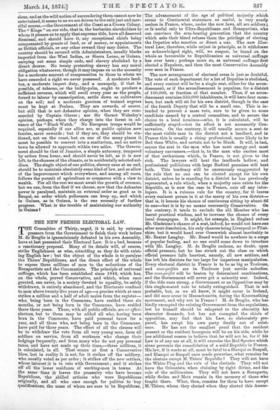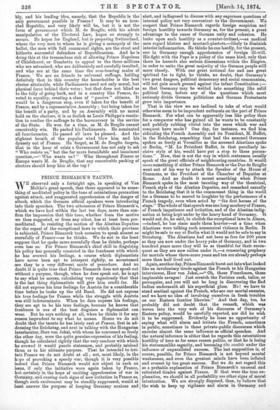THE NEW FRENCH ELECTORAL LAW.
THE Committee of Thirty, urged, ibis said, by extreme pressure from the Government to finish their work before M. de Broglie is ignominiously defeated in his own Assembly, have at last presented their Electoral Law. It is a bad, because a reactionary proposal. Many of its details will, of course, strike Englishmen as wise, coinciding as they do with exist- ing English law ; but the object of the whole is to paralyse the Thiers' Republicans, and the direct effect of the whole to expose three millions of men to the seductions of the Bonapartists and the Communists. The principle of universal suffrage, which has been established since 1848, which has, on the whole, proved Conservative, and which, when once granted, can never, in a society devoted to equality, be safely withdrawn, is entirely abandoned, and the Electorate confined to men above twenty-five years of age—a proviso which at once strikes a million and a half of adult males from the register— who, being born in the Commune, have resided there six months, or not being born in the Commune, have resided there three years. These, with all public officials, are ex officio electors, but to them may be added all who, having been born in the Commune, have paid personal taxes for a year, and all those who, not being born in the Commune, have paid for three years. The effect of all the clauses will be to withdraw the vote from all very young men, from all soldiers on service, from all workmen who change their lodgings frequently, and from many who do not pay personal taxes, and have not made up their time,—three millions, it is calculated, in all. That seems at first a Conservative blow, but in reality it is not, for it strikes off the soldiery, who usually voted as per order ; it strikes off the new settlers, whose interest it is to vote with Government ; and it strikes off all the lower residuum of working-men in towns. At the same time it leaves the peasantry who have become Republican, the skilled artisans who were Republicans originally, and all who care enough for politics to buy qualifications, the mass of whom are sure to be Republican. The advancement of the age of political majority which seems to Continental statesmen so useful, is very nearly useless in France, where, under the new laws, all are soldiers; or is useful only to Ultra-Republicans and Bonapartists, whoa can convince the arm-bearing generation that the country which asks their blood refuses them the privilege of electing the Deputies who sanction or direct a war. The new Elec- toral Law, therefore, while unjust in principle, as it withdraws an acknowledged right, will, we suspect, be found on the whole as favourable to Republicanism as universal suffrage has ever been ; perhaps more so, as universal suffrage first elected a Napoleon, and then the most Conservative Assembly ever seen in France.
The new arrangement of electoral areas is just as doubtful. The vote of each department for a list of Deputies is abolished, and every contest will be for a single seat, either for the uron- dissement, or if the arrondissement is populous, for a district of 100,000, or fraction of that number. Thus, if an arron- dissement contains 350,000 inhabitants, it will have four mem- bers, but each will sit for his own district, though in the CMS of the fourth Deputy that will be a small one. This is in- tended to prevent a mass vote, sure to be given to some candidate named by a central committee, and to secure the choice to a local nominee—who, it is calculated, will be sufficiently stupid—but its effect is not necessarily Con- servative. On the contrary, it will usually secure a seat to the most visible man in the district not a landlord, and in France this is usually a rising professional, more likely to be Red than White, and certain not to be Black. It will, in fseit, secure the seat to the man who has most energy and most voluntary canvassers,—that is, to the man who excites most of that enthusiasm which, in France, is not given to the rich. The lawyers will beat the landlords hollow, and professional politicians with large Radical promises will beat both. This tendency will be enormously exaggerated by the rule that no one can be elected except for his own district, unless he is standing for a district he has previously represented, a rule which, when a majority once exists for the Republic, as is now the case in France, cuts off any inter- lopers. It is a ruinous rule for the country, for it leaves every eminent person in it at the mercy of his own district— that is, it lessens his chance of continuous sitting by about 86 to one—but it is by no means necessarily Conservative. Oa the contrary, it tends to exclude the old Member who has learnt practical wisdom, and to increase the chance of every local demagogue. It might, for example, in England redoes Mr. Gladstone's chance of a seat, indeed, he would not have one after next dissolution, his only chances being Liverpool or Flint- shire, but it would hand over Greenwich almost inevitably to Mr. Baxter Langley. Mr. Boord would be nowhere in a surge of popular feeling, and no one could come down to interfere with Mr. Langley. M. de Broglie reckons, no doubt, upon official pressure, but he has struck out the class on which official pressure falls heaviest, namely, all new settlers, and has left his districts far too large for imperious manipulation. Every electoral district in France is to be as big as Toulouse, and sous-preffets are in Toulouse just servile nobodies. The sous-prget will be beaten by determined combinations, and the Government will never get a minority seat. Indeed, if the tide runs strong, a Government or an Opposition may by this single-seated rule be totally extinguished. That is not probable, but, as -we all know, it might occur in Ireland, and did once occur in Massachusetts, during the Knownothing movement, and why not in France ? M. de Broglie, who has kindly exempted the existing Government from the regulations, lest he himself should be relegated to the obscurity his character demands, but has not exempted the chiefs of opposition, may find that his Law, so elaborately pre- pared, has swept his own party finally out of exist- ence. He has not the smallest proof that the resident peasant or the resident bourgeois will be on his side, while be has additional reason to believe that he will not be, for if his Law is of any use at all, it will exorcise the Red Spectre which alone prevents the consolidation of a solid Republic in France. His law, if it works at all, must be fatal to a Blanqui or Raspail, and Blanqui or Raspail once made powerless, what remains for the electors except M. Thiers' Republic ? They will not have the White Flag and the rule of the clericals. They will not have the Orleanists, when claiming by right divine, and the rule of the millionaires. They will not have a Bonaparte, while Sedan and Metz remain in the memory of those who fought there. What, then, remains for them to have except M. Thiers, whom they elected when they elected this Amor
bly, and his leading idea, namely, that the Republic is the only government possible in France ? It may be an iron- clad Republic, and very likely will be, but it is not the form of government which M. de Broglie, with his adroit manipulation of the Electoral Law, hopes so strongly to secure. He hopes for England, but is preparing Switzerland, where the very men to whom he is giving a monopoly of the ballot, the men with full communal rights, are the stout and hitherto successful defenders of Republicanism. And he is doing this at the tremendous risk of allowing Prince Napoleon of Chislehurst, or Gambetta to appeal to the three millions who are ostracised, who are deliberately and carefully insulted, and who are at the same time the arm-bearing males of France. We are no friends to universal suffrage, holding definitely that in this country the householder is the best elector attainable, while Parliaments need not only moral, but physical force behind their votes ; but that does not blind us to the folly of going back, and in a country like France, de- voted to equality, creating a class of " passive " citizens. It would be a dangerous step, even if taken for the benefit of France, and by a representative Assembly ; but being taken for the benefit of a party, and by an Assembly with no moral hold on the electors, it is as foolish as Louis Philippe's resolu- tion to confine the suffrage to the bureaucracy in the service of the State. He won for a time, as M. de Broglie cannot conceivably win. He packed his Parliaments. He nominated all functionaries. He passed all laws he pleased. And the slightest breath of the popular wind blew him and his dynasty out of France. He forgot, as M. de Broglie forgets, that in the hour of crisis a Government has not only to ask "Who resists us," but the far more formidable and imminent question,—" Who wants us ? " Who throughout France or Europe wants M. de Broglie, that any conceivable packing of .electors should keep him at the top ?

































 Previous page
Previous page